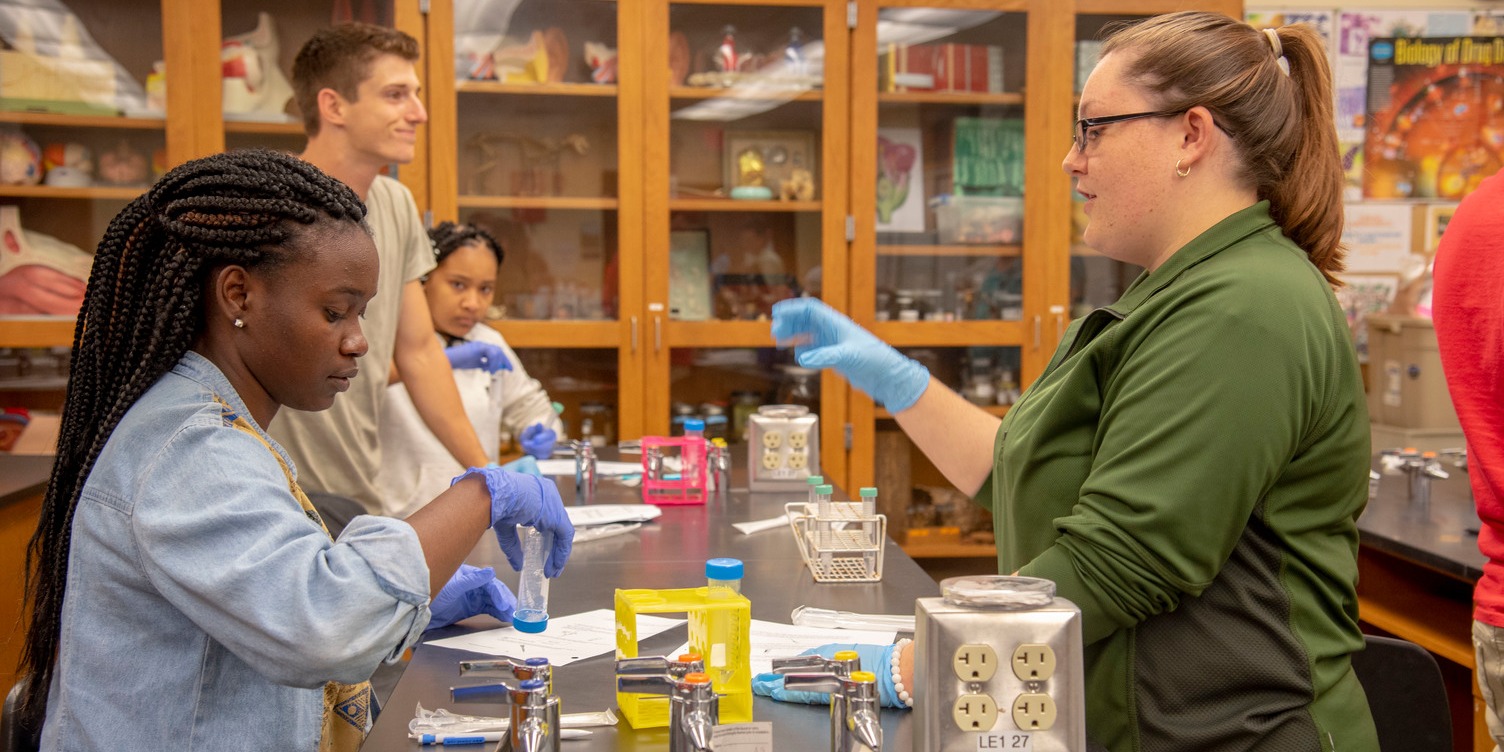Grant Fuels New Scholarships to Prepare Future Biology and Mathematics Teachers
Grant Fuels New Scholarships to Prepare Future Biology and Mathematics Teachers

Grant Fuels New Scholarships to Prepare Future Biology and Mathematics Teachers

Thanks to a new, $1.2 million grant, Saint Leo University will be awarding substantial scholarships to help as many as 18 undergraduates prepare to become biology or mathematics teachers in Florida's Pasco and Hernando county schools over the next several years.
Saint Leo is able to start this new scholarship program with grant money received from the National Science Foundation Robert Noyce Teacher Scholarship Program. Noyce (1927-1990) helped change industry and technology worldwide with his inventions and discoveries, and co-founded Intel Corp., a major supplier of computer processors.
At Saint Leo, the Noyce Teacher Scholarship Program will help biology or mathematics majors with financial need earn the credentials required to become secondary school teachers in their subject areas. The scholarships will average more than $18,000 a year, and will be applicable to the students' junior and senior years at Saint Leo. Saint Leo offers a Bachelor of Science in biology and a Bachelor of Arts in mathematics through programs at University Campus, located in Florida's Pasco County. Hernando County is directly to the north of Pasco County.
"This is the second major grant Saint Leo has received from the National Science Foundation to help educate undergraduates for careers in high-demand fields," said Saint Leo University President Jeffrey D. Senese. "The first grant came in 2016, and was for more than $647,000. We used it to create special scholarships and programming for 16 students who are now completing bachelor's degrees in either computer science or mathematics. They will go on to employment offers or graduate programs right away. Now, the National Science Foundation has entrusted Saint Leo with additional resources for more students at University Campus. We are very gratified by this show of confidence in our university."
Sizable scholarships applicable during junior and senior years
The rationale behind the Robert Noyce Scholarship Program is that America needs to address a critical shortage of teachers in STEM (science, technology, engineering, and mathematics) subjects at the elementary and secondary levels. Without these teachers, America cannot produce enough qualified individuals to meet contemporary workforce needs.
The scholarships at Saint Leo will be awarded to students in their third and fourth years of college study because that is the point when recipients will begin taking more courses critical to their biology or math majors, along with the education minor, explained Laura Altfeld, PhD, Saint Leo associate professor of biology and ecology. Altfeld is administering the grant program along with Saint Leo colleagues, including biology, life sciences, and education instructor Cheryl Berry, and Holly Atkins, PhD, chair of the undergraduate education program. (Pictured: Students in a Saint Leo biology laboratory.)
The education minor at Saint Leo delivers courses in areas such as teaching methods and classroom management, and provides access to an immersive learning environment that employs avatars to place teachers in training in realistic classroom situations so that they can have added opportunities to hone their skills. This rigorous instruction, along with supervised field placements in area schools, prepares Saint Leo college students to grow into exemplary teachers.
Additionally, the students in the Noyce Scholarship Program will receive specialized mentoring at Saint Leo that will continue beyond their college years into their first year as new teachers. Also, while they are still in college, they will automatically become part of the national network of Noyce scholars from colleges around the country, which provides peer support and annual conferences devoted to their professional development.
Saint Leo intends to supply graduates of the Noyce Scholarship Program to Pasco and Hernando schools because of the university's record of placing future teachers in those districts for training and employment, and because of those districts' continued staffing needs.
Teaching commitment comes with awards
The average scholarship at Saint Leo will be $18,750, Altfeld said. Candidates are also eligible to apply for other financial aid.
The scholarship selection process is competitive and seeks applicants with strong academic records and the resolve to carry out a commitment after graduation. Each year of scholarship funding comes with a commitment to teach for two years in a high-needs public school district after graduation. So with a full two years of funding, a graduate would be expected to teach for four years. If a recipient decides against teaching after accepting the money, the scholarship becomes a loan, Altfeld said. "We want committed students," she stressed.
The first three scholarships under the program will be awarded in the upcoming, 2020-2021 academic year at Saint Leo. That means sophomores already enrolled at Saint Leo and transfer students admitted from state colleges are eligible.
More candidates will be sought for scholarships for the 2021-2022, 2022-2023, and 2023-2024 school years, Altfeld said. Parents, teachers, high school guidance counselors, prospective transfer students, and rising high school juniors and seniors are also urged to visit the program's webpage at https://www.saintleo.edu/stem-teaching and to email ACES@saintleo.edu for further information. Students can be from anywhere in Florida, or any other state, to be eligible for the scholarships, but must be U.S. citizens and be willing to teach in the local counties.
Beyond the attractions of the scholarship program, Saint Leo also offers its students personalized attention and small class sizes, Altfeld said. Additionally, the university enjoys a strong reputation with hiring officials at school districts across Central and North Florida.